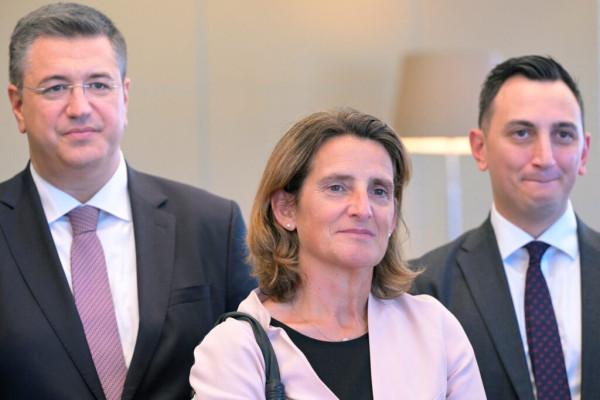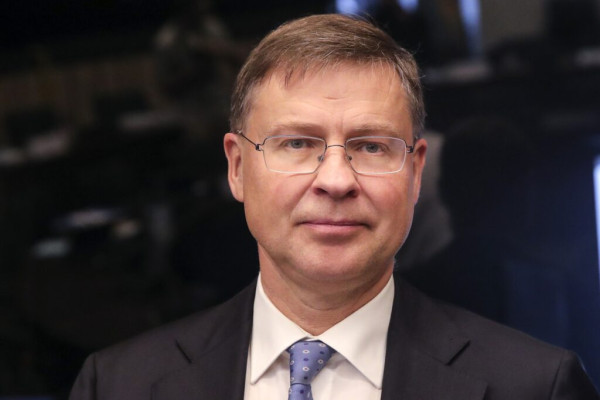Germany retains quiet grip on Europe’s finances
BRUSSELS — Appearances can be deceiving. While the European Commission’s reorganization this week made it seem as if big-spending governments from the south had seized control, in reality Germany and co. retain an iron grip.
Commission President Ursula von der Leyen’s decision to give powerful-sounding titles during her next five-year term to officials from Spain, France and Italy — countries that tend to run up debt rather than tighten the purse-strings — is clever politics, but no more than that.
Tightfisted EU veterans, of the kind beloved by Germany, the Dutch and the other governments in parsimonious northern Europe, will keep control of huge parts of the Commission linked to economic policy. Notably this includes Latvia's Valdis Dombrovskis, who has served as commissioner for a decade including two spells as economy chief, and is known as a fiscal conservative.
The significance of the underlying arrangements cannot be overstated at a time when Europe’s economy is struggling and governments are as divided as ever over whether the situation calls for further investment or balancing the books.
Job titles don't mean much
Von der Leyen bestowed the grandiose title “executive vice president” — in the past given to commissioners who oversaw several portfolios — to Spain’s Teresa Ribera, France’s Stéphane Séjourné and Italy’s Raffaele Fitto.
They’ve also been assigned Orwellian-sounding missions such as a “Clean, Just and Competitive Transition” (Ribera), “Prosperity and Industrial Strategy” (Séjourné), and “Cohesion and Reforms” (Fitto).

But ultimately, officials said, they’ll be forced to rely on their supposed subordinates — the commissioners in charge of specific files — to give shape to those fuzzy slogans.
“You have to look at the DGs [Directorates-General, a Brussels version of national ministries], all the rest is simply titles,” said one EU diplomat. “And if you look at who’s in charge of the DGs, it’s all the trusted men of von der Leyen.”
Or as a second EU diplomat put it: The commissioners “will be the guard dogs of their bosses [the executive vice presidents].”
The bloc's so-called frugal countries had been worried by the prospect of someone French policing the EU’s national spending rules given Paris’ high debt and excessive spending. France is currently in an “excessive deficit procedure,” meaning the Commission could push for it to be fined if it doesn’t rein in spending in the coming years.
But a senior Commission official said that Dombrovskis will actually play the lead role in monitoring national budgets.
“Power in the Commission depends a lot on the individual and their ability to bring people together” as opposed to formal structures, they said.
Dombrovskis will have direct control over the economy department, DG ECFIN, even though technically he will be answerable to Séjourné.
“Controlling ECFIN is what gives you the power,” another official said.
Bringing people together
Dombrovskis will also keep an eye on the designated Italian commissioner, Raffaele Fitto, with whom he’ll share control of the bloc’s €700 billion post-Covid recovery fund. Italy has the second highest debt in the eurozone and is the main beneficiary of the fund.
In addition to Dombrovskis, von der Leyen deployed loyalist and Brussels old-timer Maroš Šefčovič of Slovakia to take charge of trade, and Dutchman Wopke Hoekstra to cover climate.

“Von der Leyen would never go against the Germans,” another EU official said. “There is clear balance between the southern, spender-friendly countries and the frugal countries in this structure. They can all keep an eye on each other, just as they did in this [outgoing] Commission.”
Other commissioners-designate from so-called frugal countries, such as Hoekstra and Denmark's Dan Jørgensen, will control the EU’s climate and energy departments in a bid to balance the executive vice-president who sits above them, Spanish socialist Ribera.
In a further concession to the northerners, Hoekstra was surprisingly assigned the tax file despite misgivings from critics about his involvement in the “Pandora Papers” tax haven scandal years ago.
“Obviously people will look a lot at the EVPs [executive vice-presidents], but in reality, I think the key-holders are the holders of the individual files,” said the senior Commission official.